
Hong Kong lockdown: 10,000 confined for massive Covid-19 testing operation in Yau Tsim Mong, as fleeing residents prompt implementation review
- Government declares lockdown of an estimated 200 buildings in area of Yau Tsim Mong spanning nearly 500,000 sq ft
- About 3,000 civil servants including police and other disciplined services officers are expected to be deployed for the unprecedented screening operation
Hong Kong placed 10,000 residents in one of its most crowded districts under Covid-19 lockdown on Saturday, as the city leader said officials would investigate how to avoid a repeat of people fleeing in advance of any future confinement orders.
Officials from 4am sealed off about 200 buildings in Yau Tsim Mong district and deployed around 3,000 government workers to carry out emergency testing in a drastic bid to stem the alarming spread of Covid-19 in the city.
News of the first lockdown under legislation introduced last month was leaked ahead of its roll-out, offering residents the opportunity to escape the clutches of the city’s toughest pandemic restrictions yet.
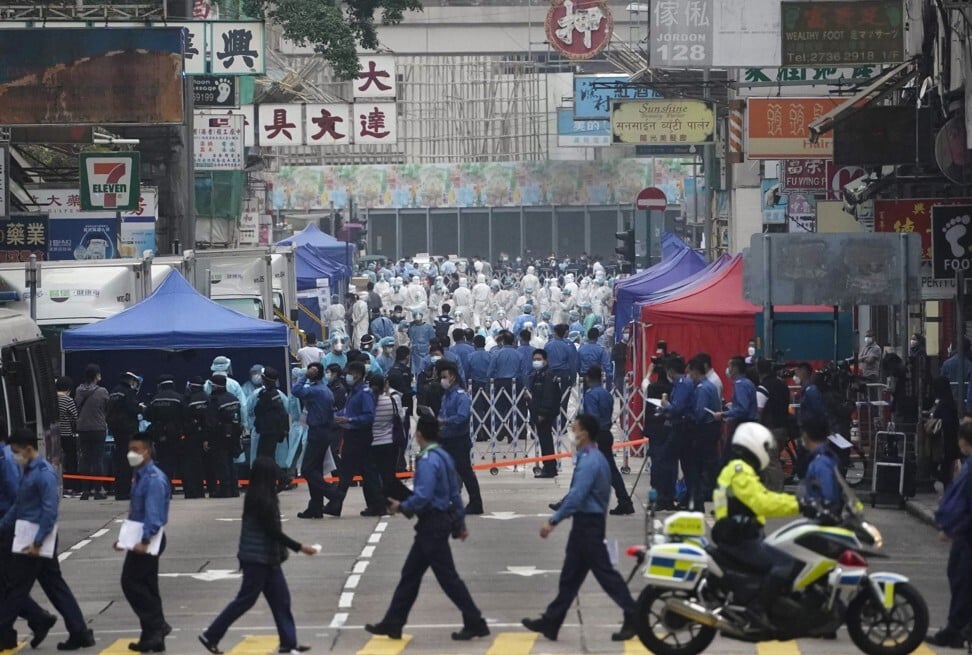
Residents who were unwittingly outside the area when it was cut off found themselves separated from their families, before ministers ordered frontline workers to allow households to reunite.
Others left their homes to be met with police cordons and patrols, as well as their route to work or other activities blocked.
The area under lockdown, which measures nearly 500,000 sq ft and overlaps a designated mandatory-testing zone, borders Kansu Street to the north and Nanking Street in the south. The eastern and western boundaries are Woosung Street and Battery Street, respectively.
She said the government would look into the issue of residents having advanced warning of the lockdown, while acknowledging it was difficult to ensure the information would not be leaked because 3,000 workers were involved in the operation.
“We need to study seriously whether we should take action and make an announcement earlier once the media has exposed the plan,” Lam said.
“If the residents knew the operation only lasted 48 hours and that the government would provide them food packs and a hotline, maybe they would be less anxious and would not have fled the area.”
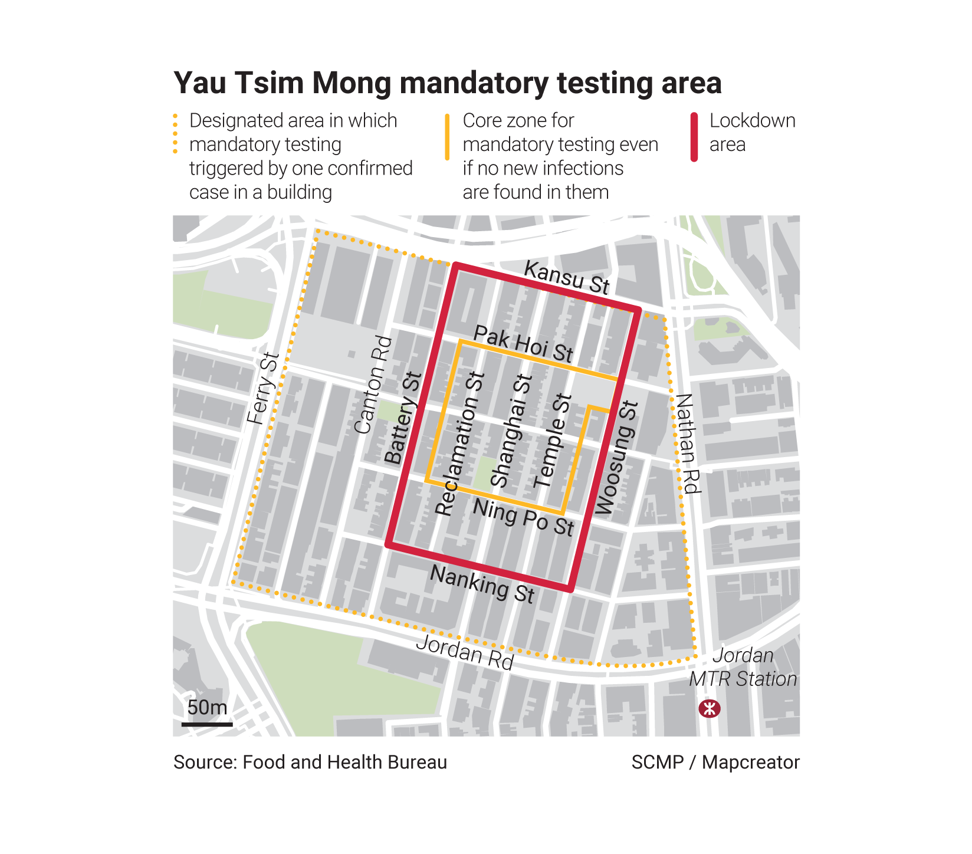
Lam also said the operation was nothing like the “lockdowns” imposed in mainland China, referring to the scheme as a “restriction testing declaration” and adding it would be lifted once screening was completed.
She stressed she was not under pressure from Beijing to impose the measure.
The chief executive also sidestepped questions on whether affected residents would be offered compensation, as some had demanded since they could not go to work. Lam would only say they had been provided with food packs and a hotline to seek help.
“For example, we know the residents being affected are not allowed to leave their homes for up to 48 hours. So what the government has done is we provide them with food packs, which we believe should be able to support them for the next two days,” Lam said.
She said the lockdown was necessary after 162 confirmed cases were found in 56 housing blocks in the Jordan area between January 1 and January 20.
Residents who left the area ahead of the curbs were still legally bound to take a Covid-19 test, Lam pointed out.
Responding to criticism over inconvenience for residents, she said the government aimed to finish the exercise by Monday morning to minimise the impact.
By 1pm, 3,000 people residing in more than 50 buildings in the area had been screened, the government said.
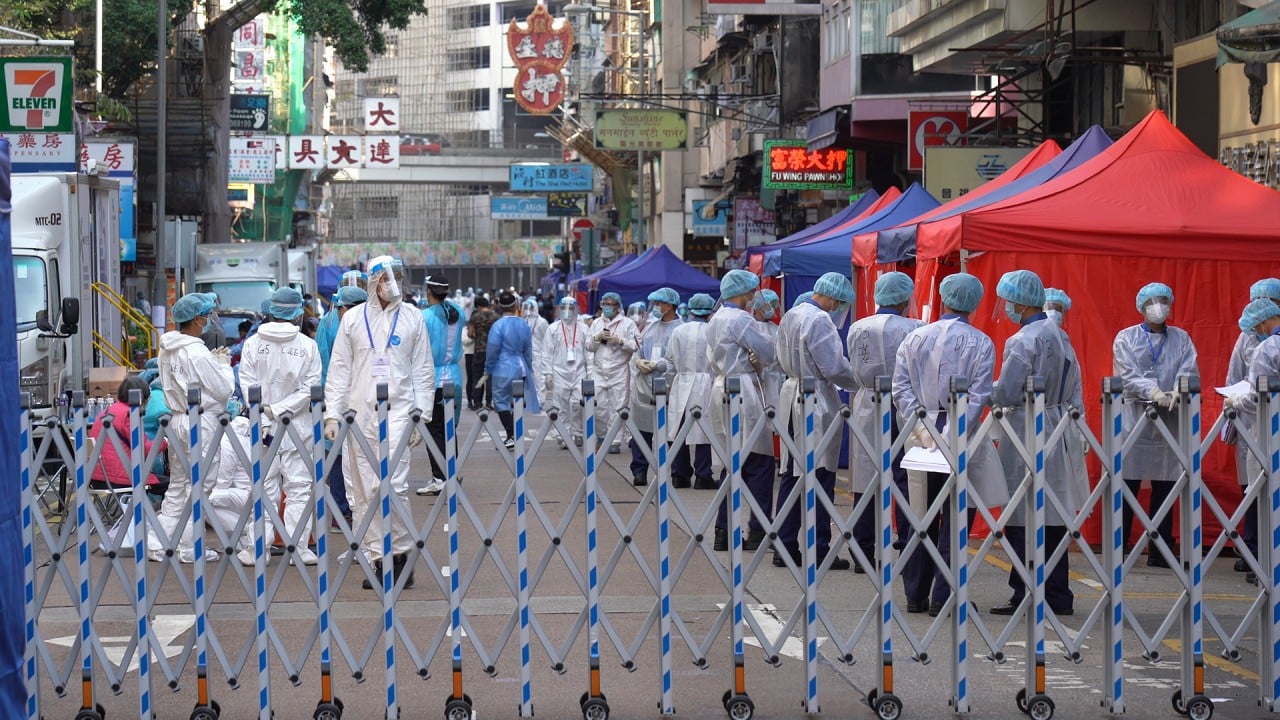
03:02
Hong Kong coronavirus lockdown: 10,000 people confined as police cordon off part of Yau Tsim Mong
The government has ordered everyone in the area to get tested by the end of Saturday, as it aimed to allow residents to leave the sealed-off section for work from about 6am on Monday.
Secretary for Home Affairs Caspar Tsui Ying-wai said 10,000 residents in the locked-down section were to be tested, with 3,000 civil servants deployed for the mission.
Of those, more than 1,700 were police or other disciplined services officers, according to sources.
What lockdown means for thousands in Hong Kong, who it affects
Tsui said the Home Affairs Department had established resting places for non-residents who were trapped inside the zone. He discouraged outsiders from delivering supplies of any kind to those inside the area.
Amid complaints that food would go stale and customer orders were being abandoned, the minister stopped short of committing to compensating affected businesses in the neighbourhood.
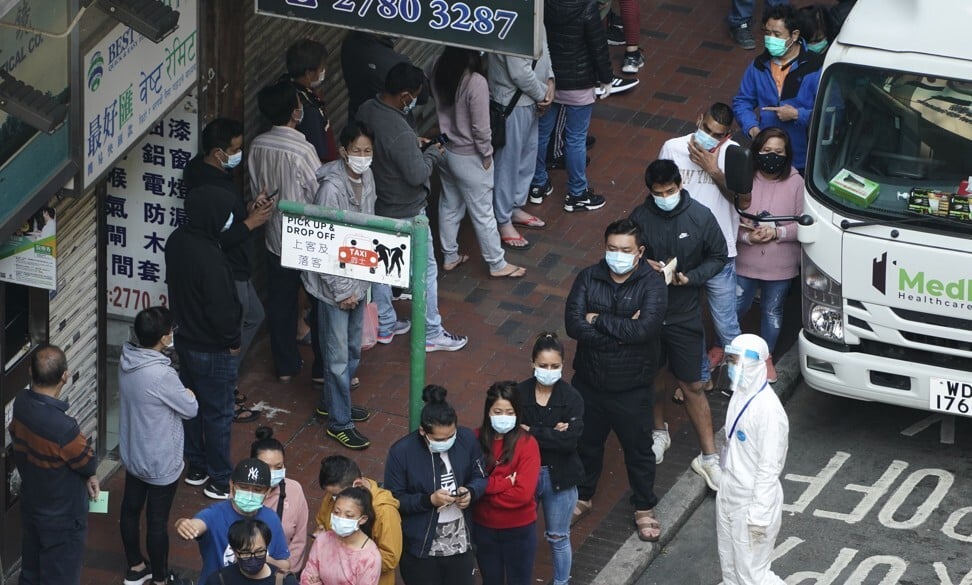
Secretary for Food and Health Professor Sophia Chan Siu-chee said those who had been in the area for more than two hours in the past 14 days were also required to get tested by the end of Saturday, even if they were no longer inside the zone.
Residents outside the area but wishing to go home should be allowed to do so, she clarified.
Hong Kong to lock down 150 residential buildings in a first for city’s Covid-19 battle
She did not rule out a second batch of testing for the neighbourhood, subject to the first round’s results.
Secretary for the Environment Wong Kam-sing said nearly 90 per cent of sewage samples collected from a block of about 40 buildings in the area had returned positive readings for the coronavirus.

Also on Saturday, Hong Kong surpassed 10,000 coronavirus cases on the anniversary of the city’s first infections.
Of the 81 new cases, 21 were from Yau Tsim Mong.
Looking back at the government’s pandemic battle over the past year, Lam said on Saturday: “There is always room for perfection, especially on [battling] a virus that everyone is unfamiliar with.
Under the lockdown rules, everyone within the restricted area must get screened for Covid-19 at 51 mobile testing facilities stationed locally before the end of Saturday.
No one can leave the zone until the restrictions are lifted.
Just three types of people will be allowed to enter the area: residents, relatives staying in the same flat as those in need of care, and staff members in urgently needed sectors such as elderly care.

After police cordoned off the area before dawn, officers in protective gear from other disciplined services – customs, immigration, fire services and correctional services – conducted door-to-door inspections, alongside health officers.
Some officers also waited at the entrances of cordoned-off residential buildings. Police officers stood guard around the enclosed areas.
Police arrested a man who grew irritated when officers would not allow him to enter the area and he began to struggle with them. The 47-year-old man arrived at the junction of Shanghai Street and Nanking Street shortly before 10am, saying he wanted to go home.
Officers stopped him at the cordon line and told him that he would not be allowed to leave the area for 48 hours after entering.
The man became emotional and allegedly punched an officer, who suffered a minor injury and was sent to hospital for treatment.
After the arrest, the man was allowed to enter the area.

Lou Hung-kau, who lives in the neighbourhood where he also runs a cha chaan teng, berated the government for locking down the area without warning food businesses.
The 66-year-old said: “Shutting the area down was not a problem, but the government should have informed store owners in the area in advance so that we don’t prepare the food. Now the food will go stale.”
Grocery store owner Clara Choi could not go to her shop because she did not live in the area, which made her worry about a cat she kept on the premises.
On being refused access to tend to the animal, she said: “It’s barbaric.”
Hits and misses fighting Covid-19 in roller-coaster year for Hong Kong
Amid some confusion over the rules, Woosung Street resident Norisa Ale found out on Saturday she would be separated from her husband for at least two days, having gone out for a walk in the small hours and returning after the restrictions were imposed.
“I came back at 5am and the police officers said I could not go inside even though I told him I lived here,” she said.
Ale waved at her husband as they spoke over the phone. She said she would ask a few friends for somewhere to stay.
“This is about safety for everyone,” she said, adding she could accept the arrangement.
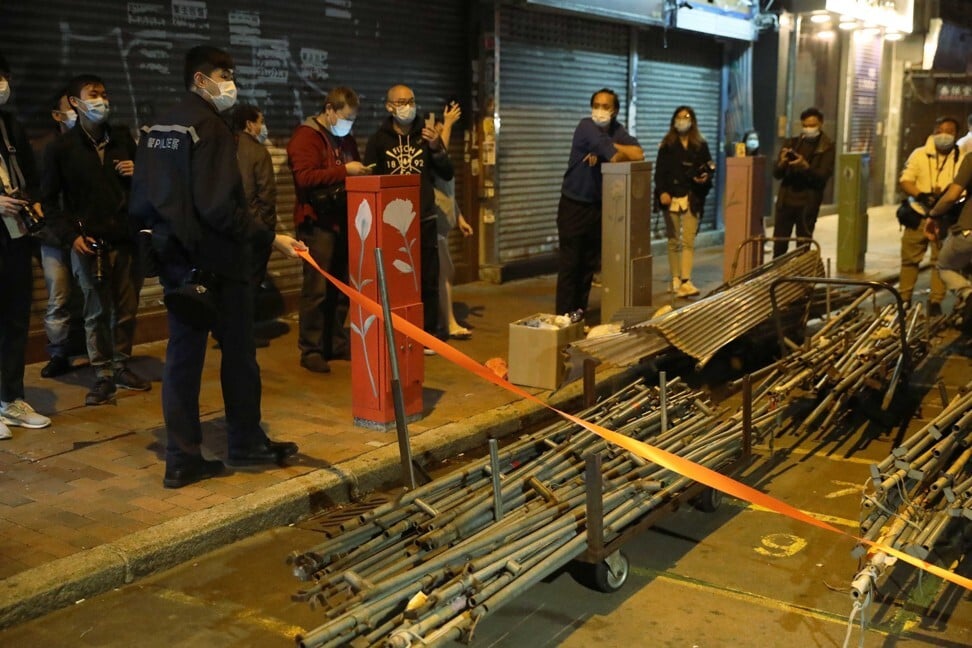
Another resident, confined to the restricted zone, had to call his boss to tell him he could not go to work.
“I went to bed really early last night, at around 9pm, so I only found out about it this morning,” he said.
The man said he was a little worried about his food supply and work.
Luk Chung-hung, a labour sector lawmaker with the pro-government Hong Kong Federation of Trade Unions, called on the government to offer compensation, such as a subsidy ranging between HK$500 (US$64) and HK$1,000 for each worker who was unable to get to his or her job as a result of the lockdown.
He questioned why the lockdown could not be done within 24 hours, pointing to authorities in Hubei province on the mainland who tested about 10 million people within several days.
For inquiries relating to the new restrictions, call the Home Affairs Department on 2399 6469 and 2399 2319. The department has also set up a hotline for members of ethnic minority communities on 3755 6816.
Additional reporting by Ethan Paul and Rachel Yeo




